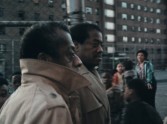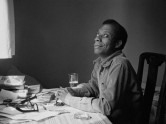
Take this Hammer – Director’s Cut
The Negro and the American Promise
Society acts on the assumption that to make money is more important than to have citizens. We’re paying too high a price for this. … These goals aren’t worthy of a man, and these adolescents know it.
Produced by a newly created independent documentary unit of KQED, Take This Hammer features James Baldwin touring San Francisco with Orville Luster James, the Executive Director of Youth For Service, dedicated to supporting Black children. Baldwin is interested in exploring the “real situation of Negroes” in a city undergoing rampant “urban renewal” in the name of progress. In addition to confirming how such practices disregard whole swathes of the population—“Society acts on the assumption that to make money is more important than to have citizens”—Baldwin speaks to community leaders and to those whose futures are gravely affected: the local teenagers. With difficulty finding jobs and support, the youth of the city articulate their frustrations with the bleak present and what they see as an even bleaker future. They also detail unwarranted altercations with police as a constant in their lives. In fact, it was the amount of footage of angry youth that led to the program being cut to a shorter version for broadcast. Nonetheless, the film remained controversial for pulling the liberal sheen off a San Francisco just as rife with racism as the rest of the country. Capped by an eloquent Baldwin monologue, Take This Hammer frankly documents the socioeconomic puzzles of a city in transition, with its white population in denial and its Black population figuring out how to survive.
Featuring three of the most famous civil rights leaders then and now, this remarkable show was hosted by Dr. Kenneth Clark, a psychology professor at the City College of New York who himself was a prominent activist. Between the separate interviews of Martin Luther King, Jr., Malcolm X and James Baldwin, the NET-produced program features disturbing documentary clips, including police abuse of peaceful protesters and King speaking at a recently destroyed Black church. While Dr. King defends the strength of non-violent resistance and love, Malcolm X refutes the view that Muslims promote violence rather than self-defense. He also fiercely disparages integration (“You don’t integrate with a sinking ship.”) and criticizes “elites” like Baldwin who mingle with the oppressors. Less critical of either position than he is of the underlying instigation, Baldwin articulates the inevitable ambiguity and contradiction of Black American existence: “one is a little bit colored and a little bit white.” He mentions an incident filmed for Take This Hammer, describing how Black youth feel they have no country, and that the lack of trust in the government is well-founded. In fact, none of the guests reveal much faith in the Kennedy administration; Baldwin and Clark were fresh from a heated meeting with Robert Kennedy, and Baldwin’s rage and despair are palpable. He explains that white America is composed of “moral monsters” who are afraid to look within at the hate they continue to nurture.














